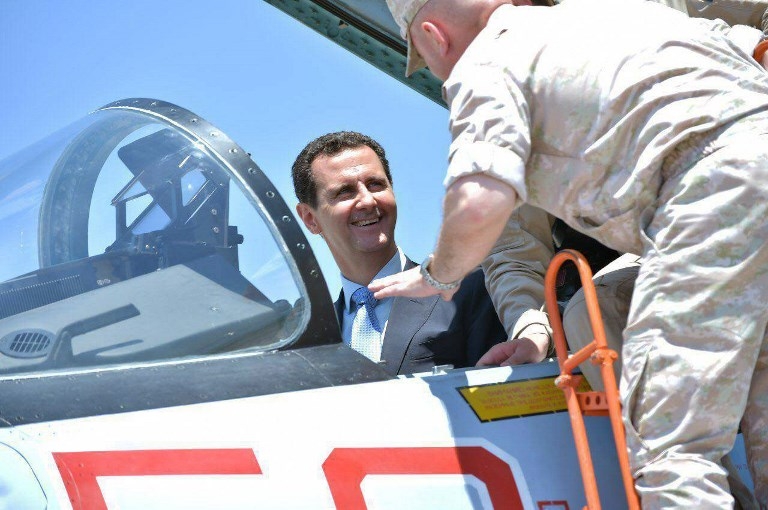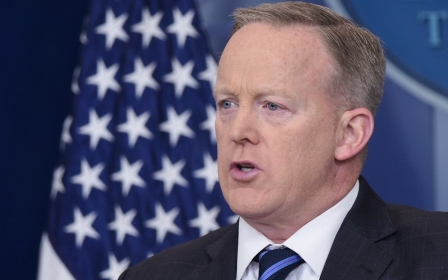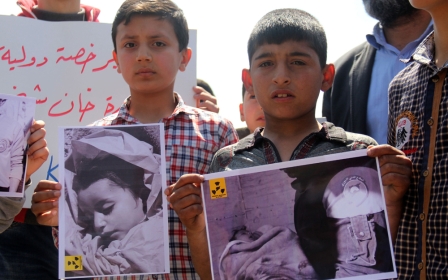US claims 'chemical weapons activity' at Syria airbase

The United States saw what appeared to be active Syrian preparations for a possible chemical weapons attack at Shayrat airfield, the same Syrian airfield the United States struck in April, Pentagon spokesman Captain Jeff Davis said on Tuesday.
"This involved specific aircraft in a specific hangar, both of which we know to be associated with chemical weapons use," Davis said, speaking to reporters by phone from Washington.
Davis added that the activity dated back to "the past day or two", but did not say how the US collected its intelligence.
Russia on Tuesday dismissed the White House assertions that a strike was being prepared as "unacceptable".
The White House said on Monday the preparations in Syria were similar to actions before an 4 April chemical attack which killed dozens of civilians and prompted US President Donald Trump to order a missile strike on a Syrian air base.
But Russia, which is Bashar al-Assad's main backer in Syria's six-year-old civil war and has used its veto power on the UN Security Council several times to shield his government, challenged the US intelligence.
"I am not aware of any information about a threat that chemical weapons can be used," Kremlin spokesman Dmitry Peskov said on Tuesday.
"Certainly, we consider such threats to the legitimate leadership of the Syrian Arab Republic unacceptable."
White House officials did not respond to requests for comment on possible US plans if Syria's military conducted a chemical weapons attack.
US response?
"The United States has identified potential preparations for another chemical weapons attack by the Assad regime that would likely result in the mass murder of civilians, including innocent children," White House spokesman Sean Spicer said.
"If ... Mr. Assad conducts another mass murder attack using chemical weapons, he and his military will pay a heavy price."
The US missile strike on the Shayrat airfield in Syria in April followed the deaths of 87 people in what Washington said was a poison gas attack in rebel-held territory. Syria denied it carried out the attack.
If the Americans take similar action again, I want to be very clear - we will support it
- Michael Fallon, British defence minister
Assad said in an interview with the AFP news agency earlier this year that the alleged April attack was "100 percent fabrication" used to justify a US air strike.
US ambassador to the United Nations Nikki Haley said the Trump administration intended its warning to be aimed not just at Syria's government but also at Russia and Iran, another supporter of Assad.
"I believe that the goal is, at this point, not just to send Assad a message but to send Russia and Iran a message that if this happens again we are putting you on notice," Haley said in a hearing in the US House of Representatives.
She stressed that the primary US goal in Syria is to fight Islamic State, not to remove Assad.
"I don't see a healthy Syria with Assad in place, but the US priority has and continues to be to fight ISIS," she said.
British Defence Minister Michael Fallon said London would support US action to prevent a chemical weapons attack but that it had not seen the intelligence on which Washington based Monday's statement.
"As always in war, the military action you use must be justified, it must be legal, it must be proportionate, it must be necessary. In the last case (in April), it was," Fallon told BBC Radio 4’s Today programme.
"If the Americans take similar action again, I want to be very clear - we will support it."
And French President Emmanuel Macron agreed with Trump in a phone call on Tuesday to work together to find a common response in case of a new chemical attack in Syria, the French presidency said.
US and allied intelligence officers had for some time identified several sites where they suspected Assad's government may have been hiding newly made chemical weapons from inspectors, said a US official familiar with the intelligence.
The assessment was based in part on the locations, security surrounding the suspect sites and other information which the official, who spoke on condition of anonymity, declined to describe.
The White House warning, the official said, was based on new reports of what was described as abnormal activity that might be associated with preparations for a chemical attack.
Although the intelligence was not considered conclusive, Washington decided to issue the public warning to the Syrian leadership to try to deter such a strike, said the official, who declined to discuss the issue further.
Assad visits Russian air base
Assad on Tuesday made his first visit to Russia’s air base at Hmeimim in western Syria.
Photos circulated showed the Syrian leader in the cockpit of a Russian Sukhoi SU-35 warplane, and inspecting an armoured vehicle at the base near Lattakia. He was accompanied by Russian chief of staff General Valery Gerasimov, state news agency SANA reported.
"The Syrian people will not forget that its Russian brothers stood next to them in this national war," Assad wrote in a visitors' book at the base, SANA reported.
The base has been at the heart of Moscow's military effort in support of Assad since 2015.
Assad has been touring areas north of Damascus in recent days, a rare trip out of his seat of power in the capital. On Sunday he performed Eid prayers in the city of Hama, the first time he has visited the city since the start of the conflict.
State media also reported on Tuesday that Assad had visited wounded soldiers in the Hama countryside, accompanied by his wife Asma and children in footage screened by state media.
New MEE newsletter: Jerusalem Dispatch
Sign up to get the latest insights and analysis on Israel-Palestine, alongside Turkey Unpacked and other MEE newsletters
Middle East Eye delivers independent and unrivalled coverage and analysis of the Middle East, North Africa and beyond. To learn more about republishing this content and the associated fees, please fill out this form. More about MEE can be found here.




